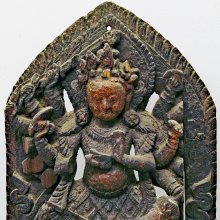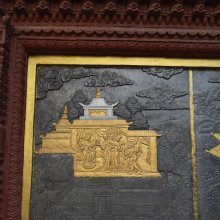Shish, Śiś, Śiṣ, Shis: 10 definitions
Introduction:
Shish means something in Hinduism, Sanskrit, Hindi, biology. If you want to know the exact meaning, history, etymology or English translation of this term then check out the descriptions on this page. Add your comment or reference to a book if you want to contribute to this summary article.
The Sanskrit terms Śiś and Śiṣ can be transliterated into English as Sis or Shish, using the IAST transliteration scheme (?).
Images (photo gallery)
Biology (plants and animals)
Source: Google Books: CRC World Dictionary (Regional names)Sis in India is the name of a plant defined with Crotalaria burhia in various botanical sources. This page contains potential references in Ayurveda, modern medicine, and other folk traditions or local practices It has the synonym Crotalaria burhia var. tomentosa Boiss..
Example references for further research on medicinal uses or toxicity (see latin names for full list):
· Annals of the Missouri Botanical Garden (1994)
· Cytologia (1979)
· A Numerical List of Dried Specimens (5386)
If you are looking for specific details regarding Sis, for example pregnancy safety, health benefits, extract dosage, diet and recipes, side effects, chemical composition, have a look at these references.

This sections includes definitions from the five kingdoms of living things: Animals, Plants, Fungi, Protists and Monera. It will include both the official binomial nomenclature (scientific names usually in Latin) as well as regional spellings and variants.
Languages of India and abroad
Sanskrit dictionary
Source: DDSA: The practical Sanskrit-English dictionaryŚiś (शिश्).—1 P. (śaśati) To leap, bound, jump.
--- OR ---
Śiṣ (शिष्).—I. 1 P. (śeṣati) To hurt, kill. -II. 1 P., 1 U. (śeṣati, śeṣayati-te) To leave as a remainder, spare. -III. 7 P. (śinaṣṭi, śiṣṭa)
1) To leave as a reminder, leave, leave remaining.
2) To distinguish or discriminate from others. -Caus. (śeṣayati-te) To leave &c.
Source: Cologne Digital Sanskrit Dictionaries: Shabda-Sagara Sanskrit-English DictionaryŚiṣ (शिष्).—r. 1st cl. (śeṣati) To hurt, to injure or kill. r. 1st and 10th cls. (śeṣati śeṣayati-te) To leave a residue, not to use the whole. (Usually with vi prefixed.) To excel. (ḹ and with vi prefixed.) viśiṣḷ r. 7th cl. (viśinaṣṭi) To assign attributes or qualities to, to distinguish, to individualize, to specify.
Source: Cologne Digital Sanskrit Dictionaries: Benfey Sanskrit-English DictionaryŚiṣ (शिष्).—i. 1, [Parasmaipada.] To hurt, to kill.
--- OR ---
Śiṣ (शिष्).—ii. 7, śinaṣ, śiṃṣ, [Parasmaipada.] To leave; pass. To be left, Mahābhārata 2, 1964. Ptcple. of the pf. pass. śiṣṭa. 1. Left, remaining. 2. Also sbst. Chief, [Hitopadeśa] 100, 15. Comp. Viṣama-, adj. unfair (division). [Causal.] śeṣaya, To leave, to spare, Mahābhārata 3, 14760.
— With the prep. ava ava, pass. To be left, Mahābhārata 3, 2276. avaśiṣṭa, Remaining, [Hitopadeśa] 61, 4, M. M.; remainder, [Mānavadharmaśāstra] 3, 116; [Hitopadeśa] 103, 14 (ava- śiṣṭa-bala, adj. With the rest of [my] army). [Causal.] avaśeṣita (perhaps ava- śeṣa + ita), Left, spared, Mahābhārata 1, 5129.
— With samava sam-ava, [Causal.] pass. samavaśeṣita, Left, spared, Mahābhārata 1, 6337.
— With ud ud, ucchiṣṭa, 1. Left, remainder, [Daśakumāracarita] in
— With nis nis, [Causal.] niḥśeṣita (perhaps rather niḥśeṣa, i. e. nis-śeṣa, + ita), 1. Used up entirely (without leaving any part), [Rāmāyaṇa] 1, 65, 6. 2. Exterminated, [Pañcatantra] 201, 22 (cf. my translation, n. 1210).
— With pari pari, [Causal.] To leave, [Bhaṭṭikāvya, (ed. Calc.)] 17, 93; with na, To destroy, [Raghuvaṃśa, (ed. Stenzler.)] 12, 79.
— With vi vi, To distinguish, to make distinguished, to augment, [Mālatīmādhava, (ed. Calc.)] 71, 8. Pass. 1. To be distinguished, [Raghuvaṃśa, (ed. Stenzler.)] 17, 62. 2. To prefer, with abl. and instr., Mahābhārata 3, 14735. Pass. a. To be better than, [Mānavadharmaśāstra] 2, 83; Böhtl. Ind. Spr. 1678 (mūrkha-sahasreṇa prājñe eka vi śiṣyate, One wise man is better than a thousand fools); to be of more weight, [Rāmāyaṇa] 2, 35, 8. b. To be most preferable, best, [Hitopadeśa] iii. [distich] 50; to be pre-eminent, [Mānavadharmaśāstra] 9, 297. viśiṣṭa, 1. Having distinctive and exclusive properties, Bhāṣāp. 132. 2. Especial. 3. Endowed with, possessed of. 4. Distinguished, [Hitopadeśa] pr. 42, M. M.; superior, pre-eminent,
— With pravi pra-vi, To increase, [Uttara Rāmacarita, 2. ed. Calc., 1862.] 102, 5.
— With prativi prati-vi, prativiśiṣṭa, Better than (with abl.), Mahābhārata 1, 4684.
— Cf. [Latin] quæso, quæro, quæstor, perhaps cura; [Gothic.] qvisteins, qvistjan, fra -qvisteins, fra-qvistjan, fra-qvistnan, us-qvistjan, based on a noun qvist = *śiṣ + ti, Leaving, abandoning; also us-haista, Poor.
Source: Cologne Digital Sanskrit Dictionaries: Cappeller Sanskrit-English DictionaryŚiṣ (शिष्).—śinaṣṭi śiṃṣati [participle] śiṣṭa (q.v.) leave; [Passive] śiṣyate be left, remain, [with] na want, be missing. [Causative] śeṣayati, te leave, spare.
Source: Cologne Digital Sanskrit Dictionaries: Monier-Williams Sanskrit-English Dictionary1) Śiṣ (शिष्):—1. śiṣ [class] 1. [Parasmaipada] śeṣati, to hurt, injure, kill, [Dhātupāṭha xvii, 36.]
2) 2. śiṣ [class] 7. [Parasmaipada] ([Dhātupāṭha xxix, 14]) śinaṣṭi (in, [Taittirīya-brāhmaṇa] also śiṃṣati, in later lang. [present participle] śeṣat; [imperative] śiṇḍḍhi or śiṇḍhi, [Kāśikā-vṛtti; Pāṇini 8-4, 65]; [perfect tense] śiśeṣa [grammar]; śiśiṣe, [Brāhmaṇa]; [Aorist] aśiś-hat, [ib.]; Prec. śiṣyāt [grammar]; [future] śeṣṭā, [ib.]; śekṣyati, te, [Brāhmaṇa]; [indeclinable participle] śiṣṭvā, [Āśvalāyana-śrauta-sūtra]; śiṣya, -śeṣam, [Brāhmaṇa] etc.),
2) —to leave, leave remaining, [Taittirīya-brāhmaṇa; ???] ([according to] to [Dhātupāṭha] also ‘to distinguish’) :—[Passive voice] śiṣyate, to be left, remain (with na, ‘to be lacking’), [Atharva-veda] etc. etc.:—[Causal] (or [class] 10.; See, [Dhātupāṭha xxxiv, 11]) śeṣayati, te ([Aorist] aśīśiṣat),
2) —to cause or allow to remain, leave, spare, [Mahābhārata; Kāvya literature] etc.:—[Desiderative] śiśikṣati [grammar]:—[Intensive] śeśiṣyate, śeśeṣṭi, [ib.]
3) 3. śiṣ weak form of √śās q.v.
Source: Cologne Digital Sanskrit Dictionaries: Yates Sanskrit-English DictionaryŚiṣ (शिष्):—śeṣati 1. a. To hurt. (ki) śeṣati, 1. a. śeṣayati 10. a. To leave a residue. With vi, to excel, and (dha, ḷ) viṣinaṣṭi, 7. a. To distinguish or individualise.
Source: DDSA: Paia-sadda-mahannavo; a comprehensive Prakrit Hindi dictionary (S)Śiṣ (शिष्) in the Sanskrit language is related to the Prakrit words: Sīsa, Susu.
[Sanskrit to German]
Sanskrit, also spelled संस्कृतम् (saṃskṛtam), is an ancient language of India commonly seen as the grandmother of the Indo-European language family (even English!). Closely allied with Prakrit and Pali, Sanskrit is more exhaustive in both grammar and terms and has the most extensive collection of literature in the world, greatly surpassing its sister-languages Greek and Latin.
Hindi dictionary
Source: DDSA: A practical Hindi-English dictionary1) Shish in Hindi refers in English to:—(nm) the head; an allomorph of [shisha] used as the first member in compound words; -[e-dila] heart—as brittle as glass; ~[phula] a head ornament; ~[mahala] a palace fitted with mirrors all round; •[mem bamdara] a bull in China shop; —[jhukana/navana] to bow (in reverence/deference/obeisance)..—shish (शीश) is alternatively transliterated as Śīśa.
2) Sis in Hindi refers in English to:—(nm) the head; ~[phula] an ornament worn on the head..—sis (सीस) is alternatively transliterated as Sīsa.
...
See also (Relevant definitions)
Starts with (+268): Shimshape, Shimshumaraka, Shimshupa, Shisava, Shisham, Shisham tali, Shisham wood, Shishama, Shishan, Shishana, Shishapa, Shisharaktaballi, Shishav, Shishavanabha, Shishaya, Shishayisha, Shishayishu, Shishe, Shishi, Shishi-dama.
Ends with: Apashish, Ardhashish, Ashis, Atishish, Avashish, Durbhikshish, Kalshish, Kashish, Koshish, Nihshish, Parishish, Paryavashish, Pravishish, Ucchish, Vishish.
Full-text (+270): Sisa, Samshis, Mitrashis, Avasesa, Apashish, Atishesha, Ucchesha, Visheshya, Visheshyaka, Parisesa, Upasamdhyam, Seseti, Viseseti, Paretabhartar, Patalay, Suprabhavadeva, Nirashis, Avasissati, Avanati, Ashis.
Relevant text
Search found 20 books and stories containing Shish, Sheesh, Shis, Śiś, Sis, Śiṣ, Śis; (plurals include: Shishes, Sheeshes, Shises, Śiśs, Sises, Śiṣs, Śises). You can also click to the full overview containing English textual excerpts. Below are direct links for the most relevant articles:
Blue Annals (deb-ther sngon-po) (by George N. Roerich)
Chapter 13 - Staglungpa together with his disciples < [Book 8 - The famous Dakpo Kagyü (traditions)]
Chapter 13 - Staglungpa (xv): bkra shis dpal ba < [Book 8 - The famous Dakpo Kagyü (traditions)]
Chapter 5 - The carving of the woodblocks < [Book 15 - Monastic Systems]
Rig Veda (translation and commentary) (by H. H. Wilson)
Rig Veda 1.94.6 < [Sukta 94]
Manusmriti with the Commentary of Medhatithi (by Ganganatha Jha)
Verse 11.91 < [Section VIII - Expiation of drinking Wine (surā)]
Verse 9.169 < [Section XXIII - The Twelve Kinds of Sons defined]
Verse 10.63 < [Section VIII - Improvement in the Status of Castes]
Chaitanya Bhagavata (by Bhumipati Dāsa)
Verse 1.12.157 < [Chapter 12 - The Lord’s Wandering Throughout Navadvīpa]
Tibet (Myth, Religion and History) (by Tsewang Gyalpo Arya)
4. How Bon spread to Tibet < [Chapter 6 - Tonpa Shenrab Mibo and Bon Religion]
6. Religious Revival < [Chapter 6 - Tonpa Shenrab Mibo and Bon Religion]
7. Bon Monasteries in Tibet and India < [Chapter 6 - Tonpa Shenrab Mibo and Bon Religion]
Bodhisattvacharyavatara (by Andreas Kretschmar)
Text Section 298 < [Khenpo Chöga’s Oral Explanations]
Interview with Kyabje Khenpo Trashi Palden < [Introduction Text]

